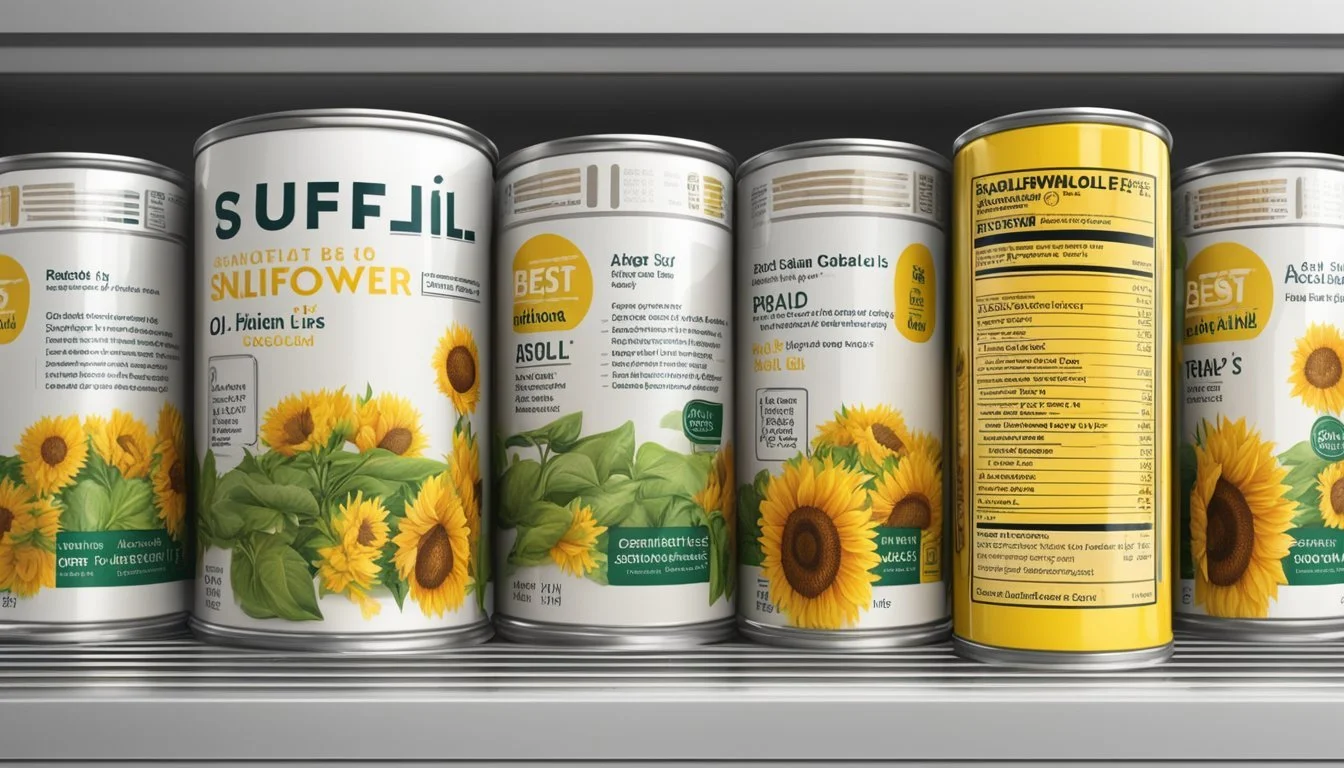How Long Does Canned Sunflower Oil Last?
Understanding Shelf Life and Storage Tips
Sunflower oil is a popular choice among cooking oils due to its mild flavor and high smoke point, making it suitable for various culinary applications. With its rich content of unsaturated fats, particularly omega-6 fatty acids, it serves as a healthier alternative to saturated fats. However, like all edible oils, sunflower oil has a limited shelf life.
When unopened and stored in a cool, dark place, sunflower oil can maintain its quality for up to two years. Once opened, the countdown to its expiry accelerates as the oil is exposed to air, light, and heat, factors that contribute to rancidity. This degradation leads to an off-putting taste and smell, indicating that the oil is no longer suitable for consumption.
To extend its shelf life, it is advisable to store sunflower oil in a sealed container, away from direct sunlight and heat sources. Refrigeration can also help preserve the oil's quality, although it is not strictly necessary. Paying attention to the 'best by' date can guide consumers on how long the oil is expected to retain its freshness and optimum quality.
Understanding Sunflower Oil
Sunflower oil is a versatile and commonly used cooking oil known for its mild flavor and high smoke point. This section aims to provide a detailed insight into its components, types, and culinary uses.
Components and Characteristics
Sunflower oil is prized for its high content of unsaturated fats, primarily in the form of omega-6 fatty acids. These fats are essential for a variety of bodily functions, including metabolism regulation and maintaining healthy skin, hair, and bones. The nutritional value of sunflower oil is comparable to other vegetable oils, providing energy and essential nutrients without contributing an overpowering flavor to dishes.
Main components:
High in unsaturated fats
Contains omega-6 fatty acids
Varieties and Comparisons
There are different varieties of sunflower oil, each characterized by the type of sunflower seed from which they are extracted. The oil can range from being high in oleic acid (monounsaturated fat) to being high in linoleic acid (polyunsaturated fat), affecting its stability and suitability for cooking. When comparing sunflower oil with other oils like olive, canola, avocado, and walnut oil, sunflower oil generally has a neutral flavor and a higher smoke point, making it more versatile for various cooking methods.
Smoke point comparison:
Sunflower oil: High
Olive oil: Medium to high
Canola oil: Medium to high
Avocado oil: High
Walnut oil: Low
Sunflower Oil in Cooking
Sunflower oil is widely utilized in both cooking and baking due to its versatile profile. It has a high smoke point, which means it can be used for frying and other high-heat applications without breaking down and producing harmful compounds. The oil's subtle flavor doesn't interfere with the taste of the food, making it an excellent medium for cooking a variety of dishes. Additionally, its quality remains consistent throughout various cooking processes.
Cooking uses:
Frying
Baking
Salad dressings
In summary, sunflower oil's composition, variety, and application in cooking make it a valuable staple in both home and commercial kitchens.
Shelf Life Fundamentals
The shelf life of canned sunflower oil is influenced by several factors including the presence of an expiration date, signs of rancidity, and the conditions under which it is stored. These elements are critical for determining the quality and safety of the oil over time.
Expiration Date Significance
The expiration date on a container of sunflower oil indicates the time frame within which the manufacturer guarantees the product’s optimal quality. However, sunflower oil often has a best-by date rather than a strict expiration date, which suggests the oil can maintain quality after this date, if stored correctly.
Best-by date: Serves as a suggestion for peak quality.
Use-by date: More critical, as it often relates to safety rather than just quality.
Detecting Rancidity
Rancidity is the degradation of oil that leads to unpleasant smell and taste, signaling that the oil has gone bad.
Odor: A sharp, unpleasant smell is a clear indicator of rancidity.
Taste: An off, bitter flavor is a sign that the oil should not be used.
Impact of Storage Conditions
Sunflower oil’s shelf life is highly dependent on its storage conditions. Here are the best practices for storage:
Air exposure: Minimize to prevent oxidative rancidity.
Light: Store in a dark place as light accelerates spoilage.
Heat sources: Keep away from heat to maintain quality.
Temperature: Room temperature is ideal, though refrigerated storage can extend shelf life.
Location: A cool, dark pantry is optimal for unopened oil; after opening, seal tightly and store properly.
By adhering to these guidelines, the shelf life of sunflower oil can be maximized, ensuring the oil remains a safe and quality product for consumption.
Proper Storage Techniques
Proper storage techniques are crucial for maintaining the quality and extending the shelf life of canned sunflower oil. They should ensure that the oil is kept in conditions that preserve its taste and nutritional value.
Optimal Environmental Conditions
To preserve the quality of canned sunflower oil, one should store it in a pantry away from heat sources. The oil thrives in room temperature conditions, preferably between 5 to 20 degrees Celsius. At these temperatures, the risk of nutrient degradation and the formation of harmful substances is minimized.
Packaging and Containment
It is crucial to keep the oil in tightly sealed containers to prevent exposure to air which can lead to rancidity. If originally packaged in a can and opened, one should transfer the remaining oil to a container with a secure lid ideally made of dark glass or food-grade plastic to protect it from light and oxygen.
Special Cases: Freezing and Refrigeration
Although not typically necessary, one can refrigerate sunflower oil to extend its shelf life; however, it may solidify due to the cold. If frozen or refrigerated, it should be allowed to thaw at room temperature and then stirred or shaken to ensure consistency. Containers must be checked regularly for signs of rust when canned goods are stored in a refrigerated environment.
Recognizing and Addressing Quality Issues
When addressing quality issues with canned sunflower oil, it is essential to recognize signs of spoilage, understand the health risks of consuming spoiled oils, and employ safe consumption practices to ensure food safety.
Signs of Spoilage
A consumer can detect spoilage in sunflower oil through sensory evaluation. Odor and taste are the first quality indicators, as spoiled oil can have an unpleasant, rancid smell and a bitter taste. Visually, high-quality sunflower oil should appear clear with a light golden hue; if it's cloudy or has changed in color, this may signify degradation. The texture of the oil should be smooth without any particles or signs of leaking, which can indicate compromised packaging and potential spoilage.
Health Risks of Spoiled Oils
Using spoiled sunflower oil poses health risks, as it can contain toxins that lead to food poisoning. When oils go bad, they can develop harmful compounds, including peroxides and aldehydes, which can be harmful if ingested in large quantities. Chronic consumption of rancid oils may contribute to the development of degenerative diseases. Therefore, it's crucial for a consumer's health and safety to avoid consuming oils that show signs of spoilage.
Safe Consumption Practices
To ensure food safety and reap the benefits of sunflower oil, consumers should follow these practices:
Check Expiration: Always look at the product's expiration date.
Storage: Store sunflower oil in a cool, dark place and tightly seal it after each use to limit exposure to air and light.
Regular Checks: Periodically assess the oil's smell, taste, and color.
Disposal: Discard any oil that has passed its expiration date or exhibits signs of spoilage, to prevent any health risks.
By adhering to proper storage methods and consuming the oil within its shelf life, consumers can maintain the oil's quality and ensure their food is both safe to eat and flavorful.
Consumption and Culinary Applications
When considering sunflower oil, two essential aspects are its longevity from a consumption perspective and how it enhances culinary creations with its distinct qualities.
Shelf Life and Food Preparation
Sunflower oil does have an expiration date. Typically, an unopened bottle of sunflower oil will remain fresh and suitable for consumption for about 12 to 24 months when stored in a cool, dark place. Once opened, it should ideally be used within 6 months for the best quality, however, it can still be safe to consume beyond this period if it hasn't developed signs of rancidity.
Signs of rancidity include:
A sharp, bitter smell.
An unpleasant taste.
A noticeable change in color.
To extend its shelf life, it’s advisable to store sunflower oil in the refrigerator, especially after opening.
Flavor and Texture Contribution
Sunflower oil is celebrated for its neutral taste and light texture, which makes it a flexible ingredient in various culinary applications. It doesn't overpower other ingredients, thereby preserving the intended flavor profile of the dish.
When used in cooking, sunflower oil can act as:
A base for dressings in salads, enhancing freshness without contributing a heavy taste.
An ingredient in marinades where it delivers moisture and binds spices to meats and vegetables.
A frying oil due to its relatively high smoke point, ensuring crisp textures without absorbing unwanted oiliness.
Its subtle flavor supports the natural taste of foods, adding to the overall sensory pleasure of the culinary experience.
Extended Topics and Considerations
When considering the longevity of canned sunflower oil, it is crucial to address the impact on health and how it compares with other vegetable oils. These aspects influence consumer choices and highlight the importance of understanding sunflower oil beyond just its shelf life.
Health Implications of Sunflower Oil
Sunflower oil, particularly high in unsaturated fats, has been associated with benefits for heart health. Unsaturated fats can help maintain a beneficial balance of cholesterol levels in the body, reducing the risk of heart disease. However, like all oils, moderation is key as excessive consumption of fats, even healthier ones, can lead to health risks including obesity and cardiovascular complications.
Comparing Sunflower Oil to Other Vegetable Oils
Sunflower Oil vs. Olive Oil:
Olive oil is renowned for its health benefits, particularly extra virgin olive oil, which is high in antioxidants and has a more favorable fatty acid profile.
Sunflower oil generally offers a neutral taste and high smoke point, making it versatile for various cooking methods.
Sunflower Oil vs. Canola Oil:
Canola oil, with lower saturated fat content, is another heart-healthy option that is often compared with sunflower oil.
Both canola and sunflower oil share similar applications in the kitchen and are considered staples among vegetable oils.
When stored correctly, sunflower oil can maintain its quality for an extended period. Consumers should ensure the oil is kept in a cool, dark place to maximize its longevity and preserve its health benefits.
FAQs and Practical Advice
This section is dedicated to addressing frequently asked questions about the shelf life of canned sunflower oil and offering straightforward guidance to maintain its quality over time.
Common Questions Answered
Q: How long does canned sunflower oil last in the pantry?
A: Canned sunflower oil typically lasts up to 12-24 months when stored in a cool, dark pantry.
Q: Can you use sunflower oil after the expiration date?
A: One may often use sunflower oil 6-12 months past the expiration date if it has been stored properly and shows no signs of rancidity.
Q: What are the signs of expired sunflower oil?
A: An oil past its prime may have a foul odor, off taste, and cloudiness, indicating it should no longer be used.
Q: Does refrigeration extend the oil's shelf life?
A: Storing sunflower oil in the refrigerator can help extend its shelf life by slowing down the oxidation process.
Tips for Ensuring Oil Longevity
Store sunflower oil in a cool, dark place such as a pantry to avoid exposure to light and heat which can accelerate spoilage.
Keep the oil tightly sealed when not in use to limit its exposure to air; oxygen can contribute to the rancidity of the oil.
Transfer oil to a smaller container if necessary to minimize the headspace, which can lead to faster oxidation once opened.
Regularly check the quality of the oil by its smell and taste before use to ensure it has not gone rancid.
By strictly adhering to these storage principles, one can ensure the longevity and maintained quality of canned sunflower oil.
Final Thoughts & Recommendations
When considering the shelf life of canned sunflower oil, they should be mindful of several factors to ensure optimal quality and safety. Here are key points to remember:
Shelf Life: Canned sunflower oil generally has a long shelf life, often 12-24 months unopened. Once opened, aim to use it within 6 months to maximize quality.
Quality: Quality can deteriorate over time, even if the oil doesn’t pose health risks. Users may notice changes in flavor, aroma, or color, indicating it's time to replace the oil.
Storage: Proper storage significantly affects sunflower oil's longevity. It should be kept in a cool, dark place and tightly sealed. If possible, store oil in the refrigerator to extend its usability.
Health Risks: Using rancid oil isn't recommended due to the potential formation of harmful compounds. Consumers should discard oil with noticeable rancidity.
Oil Care: To maintain the oil’s integrity:
Avoid repeated exposure to air by closing the container promptly.
Keep away from direct heat sources.
Consider transferring oil to a dark glass bottle if the original container isn't opaque.
Here's a quick reference table for Storage and Shelf Life:
State Shelf Life Storage Condition Unopened Up to 24 months Cool, dark pantry Opened Up to 6 months Refrigerate if possible
By adhering to these recommendations, individuals can ensure they are using sunflower oil at its peak condition, benefiting from both its culinary attributes and nutritional value while minimizing waste and avoiding potential health risks.









